鲁教版初一英语Unit 8Do you have a soccer ball Section A课件
- 格式:ppt
- 大小:9.78 MB
- 文档页数:31
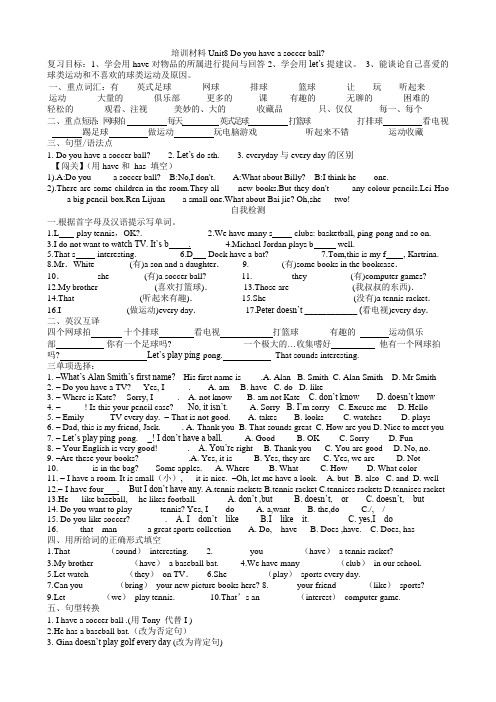
培训材料Unit8 Do you have a soccer ball?复习目标:1、学会用have对物品的所属进行提问与回答2、学会用let’s提建议。
3、能谈论自己喜爱的球类运动和不喜欢的球类运动及原因。
一、重点词汇:有____英式足球_______网球_______排球_______篮球_______让____玩____听起来_____运动_______大量的_______俱乐部______更多的______课_____有趣的_______无聊的_______困难的____轻松的_______观看、注视______美妙的、大的_______收藏品________只、仅仅______每一、每个______ 二、重点短语:网球拍每天英式足球打篮球 ___________ 打排球看电视_ 踢足球做运动玩电脑游戏___________听起来不错_________运动收藏_____三、句型/语法点1. Do you have a soccer ball?2. Let’s do sth.3. everyday与every day的区别【闯关】(用have和has 填空)1).A:Do you ____ a soccer ball? B:No,I don't. A:What about Billy? B:I think he ___ one.2).There are some children in the room.They all ___ new books.But they don't ____ any colour pencils.Lei Hao ____ a big pencil-box.Ren Lijuan ___ a small one.What about Bai jie? Oh,she __ two!自我检测一.根据首字母及汉语提示写单词。
1.L play tennis,OK?.2.We have many s clubs: basketball, ping-pong and so on.3.I do not want to w atch TV. It’s b.4.Michael Jordan plays b well.5.That s interesting.6.D Dock have a bat?7.Tom,this is my f , Kartrina.8.Mr.White _______ (有)a son and a daughter.9._______ (有)some books in the bookcase.10._______ she _______ (有)a soccer ball? 11. ________ they _________ (有)computer games? 12.My brother ____________ (喜欢打篮球).13.Those are ____________ (我叔叔的东西).14.That ___________ (听起来有趣).15.She ________________ (没有)a tennis racket.16.I ______________ (做运动)every day.17.Peter doesn’t ____________ (看电视)every day.二、英汉互译四个网球拍十个排球看电视打篮球_______有趣的运动俱乐部 _________ 你有一个足球吗? ________________一个极大的…收集嗜好他有一个网球拍吗? ________________Let’s play ping-pong. That sounds interesting. ________________三单项选择:1. –What’s Alan Smith’s first name? --His first name is ____.A. Alan B. Smith C. Alan Smith D. Mr Smith2. – Do you have a TV? -- Yes, I _____. A. am B. have C. do D. like3. – Where is Kate? -- Sorry, I _____. A. not know B. am not Kate C. don’t know D. doesn’t know4. – _____! Is this your pencil case? -- No, it isn’t. A. Sorry B. I’m sorry C. Excuse me D. Hello5. – Emily _____ TV every day. – That is not good. A. takes B. looks C. watches D. plays6. – Dad, this is my friend, Jack. --___. A. Thank you B. That sounds great C. How are you D. Nice to meet you7. – L et’s play ping-pong.- __! I don’t have a ball. A. Good B. OK C. Sorry D. Fun8. – Your English is very good! -- ____. A. You’r e right B. Thank you C. You are good D. No, no.9. –Are these your books? -- _______.A. Yes, it is B. Yes, they are C. Yes, we are D. Not10. -- _____ is in the bag? -- Some apples. A. Where B. What C. How D. What color11. – I have a room. It is small(小), __ it is nice. –Oh, let me have a look. A. but B. also C. and D. well12.–-I have four . -- But I don’t have any. A.tennis rackets B.tennis racket C.tennises rackets D.tennises racket13.He___like baseball, __he likes football. A. don’t ,but B. doesn’t, or C. doesn’t, but14. Do you want to play ______tennis? Yes, I____do A. a,want B. the,do C./, /15. Do you like soccer?________. A. I don’t like B.I like it. C. yes,I do16._____that man ______ a great sports collection A. Do, have B. Does ,have. C. Does, has四、用所给词的正确形式填空1.That ________(sound)interesting.2.________ you ________(have)a tennis racket?3.My brother ________(have)a baseball bat.4.We have many ________(club)in our school.5.Let watch ________(they)on TV.6.She ________(play)sports every day.7.Can you _______(bring)your new picture books here? 8.______ your friend ______(like)sports?9.Let ________(we)play tennis. 10.That’s an ________(interest)computer game.五、句型转换1. I have a soccer ball .(用Tony 代替I )_________________________________________________2.He has a baseball bat.(改为否定句)__________________________________________________3. Gina doesn’t play golf every day (改为肯定句)___________________________________________4. Do you have tennis rackets? (改为肯定句)_______________________________________________5. It’s Monday tomrrow (对划线部分提问)____________________________________________6.I think tennis is very interesting. (就划线部分提问)_____________________________________7.I play sports every morning. (变为否定句)____________________________________________8.There are old bikes under the tree. (变为单数句)________________________________________3.There ________ two football and a volleyball in the basket.4.Let’s ________ good friends.5.________ you spell your name, please?6.________ there a football game on TV today?7.Sorry, I ________ answer the question. It’s too difficult. 8.Card ________ like sports. She thinks it’s boring.9.________ they need more school things? 10.I ________ a football fan. I like it very much.七、完形填空I have a good friend. 1 name is Mary. She 2 from America. She is 3 China with her father and mother. She can 4 a little Chinese. She is in the No. 15 Middle School in Shanghai. Her father and mother 5 . They are in the No. 50 Middle School. Mary is a good student. She 6 school five days a week. She 7 up early. She 8 to be late. She often goes to school very early. But today she got up late. So she got to the classroom at seven thirty. 9 there weren’t any students in the classroom. She wasn’t late. She was still early. It was Saturday today. The students were all 10 .1.A .she B.He C.Her D.His 2.A.come B.comes C.are D, go3.A.at B.in C.of D.from 4.A.say B.tell C.talk D.speak5.A.is teacher B.are teachers C.is doctorD.are doctors6.A.is goB.is C.go to D.goes to7.A.like gettingB.likes getting C.like getD.likes get 8.A.like B.likesC.don’t likeD.doesn’t like9.A.And B.But C.So D.Too 10.A.at homeB.in home C.at school D. in school八、阅读下列对话并选出正确答案回答问题Jim: Let’s play computer games. Peter: That sounds good. Where’s your computer?Jim: I don’t have a computer. Do you have a computer? Peter: No, I don’t. But I have a TV. Let’s watch TV. Jim: No, it’s boring. Let’s play tennis. I have a tennis racket. Peter: Good. Where is it?Jim: On the sofa. Do you have a racket? Peter: No, I don’t. Does your brother have a racket?Jim: Yes, he does. And he has tennis balls.1.Does Jim have a computer? ________A.He has no computer. B.He has two computers. C.Yes, he does. D.No, he doesn’t.2.Jim has a racket. Where is it? ________A.It’s on the sofa. B.It’s near the sofa. C.It’s behind the sofa. D.It’s under the sofa. 3.Does Peter have a tennis racket? ________A.Yes, he does. B.He has a tennis racket. C.He has two tennis rackets. D.No, he doesn’t. 4.Does Jim have a tennis racket? ________A.Yes, he does. B.No, he doesn’t.C.He has two tennis rackets. D.He doesn’t have a tennis racket. 5.Does his brother have a tennis racket? ________A.He doesn’t have tennis balls. B.Yes, he does. C.No, he doesn’t. D.He has tennis balls.九、阅读并回答问题Wang Lei is a Chinese taxi driver. He has a son. His name is Wang Hong. He is in No. 14 Middle School.Mr Brown is his English teacher. He loves his student, and Wang Hong studies English well. Mr Brown is from America. He has two daughters. They are twins. They and Wang Hong are good friends, they are all in the same class. On Sunday the two families often go out to the park in their cars and fly kites together(一起).76.Where is Wang Hong from?______________________________________________________________ 77.What is Wang Hong’s father? __________________________________________________________ 78.Where are the Browns from? ___________________________________________________________ 79.Where does Mr Brown work now?_____________________________________________________ 80.Who are Wang Hong’s good friends? ________________________________________________ 十、书面表达假如你是Jim Green,写一篇介绍自己的短文,内容包括你自己的情况,你的家人,以及你的收藏。

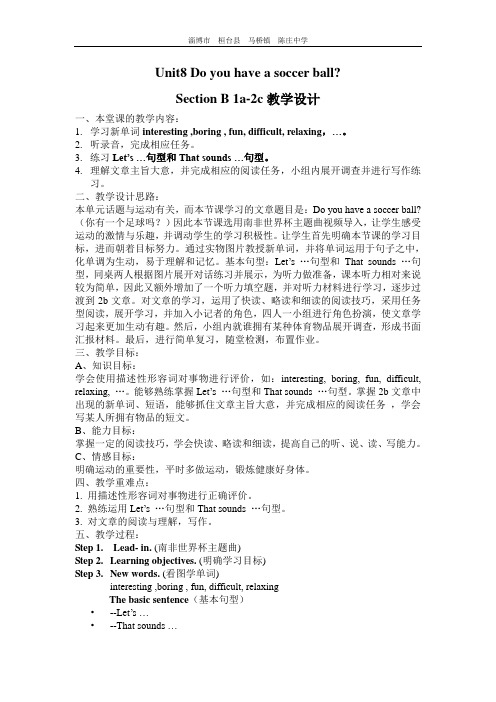
Unit8 Do you have a soccer ball?Section B 1a-2c教学设计一、本堂课的教学内容:1.学习新单词interesting ,boring , fun, difficult, relaxing,…。
2.听录音,完成相应任务。
3.练习Let’s …句型和That sounds …句型。
4.理解文章主旨大意,并完成相应的阅读任务,小组内展开调查并进行写作练习。
二、教学设计思路:本单元话题与运动有关,而本节课学习的文章题目是:Do you have a soccer ball?(你有一个足球吗?)因此本节课选用南非世界杯主题曲视频导入,让学生感受运动的激情与乐趣,并调动学生的学习积极性。
让学生首先明确本节课的学习目标,进而朝着目标努力。
通过实物图片教授新单词,并将单词运用于句子之中,化单调为生动,易于理解和记忆。
基本句型:Let’s …句型和That sounds …句型,同桌两人根据图片展开对话练习并展示,为听力做准备,课本听力相对来说较为简单,因此又额外增加了一个听力填空题,并对听力材料进行学习,逐步过渡到2b文章。
对文章的学习,运用了快读、略读和细读的阅读技巧,采用任务型阅读,展开学习,并加入小记者的角色,四人一小组进行角色扮演,使文章学习起来更加生动有趣。
然后,小组内就谁拥有某种体育物品展开调查,形成书面汇报材料。
最后,进行简单复习,随堂检测,布置作业。
三、教学目标:A、知识目标:学会使用描述性形容词对事物进行评价,如:interesting, boring, fun, difficult, relaxing, …。
能够熟练掌握Let’s …句型和That sounds …句型。
掌握2b文章中出现的新单词、短语,能够抓住文章主旨大意,并完成相应的阅读任务,学会写某人所拥有物品的短文。
B、能力目标:掌握一定的阅读技巧,学会快读、略读和细读,提高自己的听、说、读、写能力。
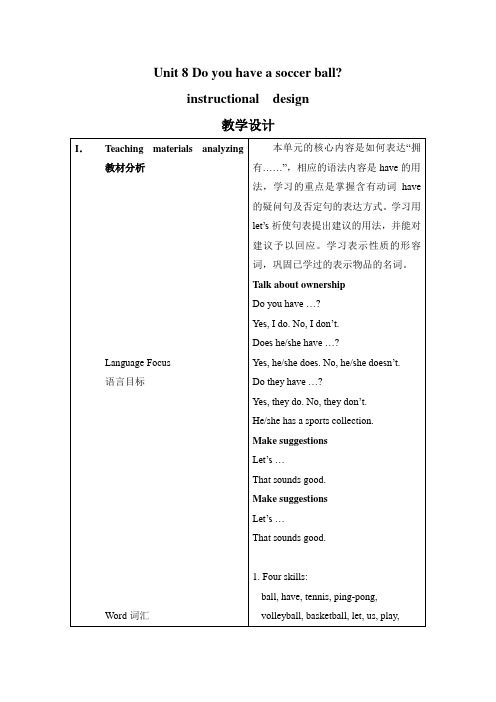
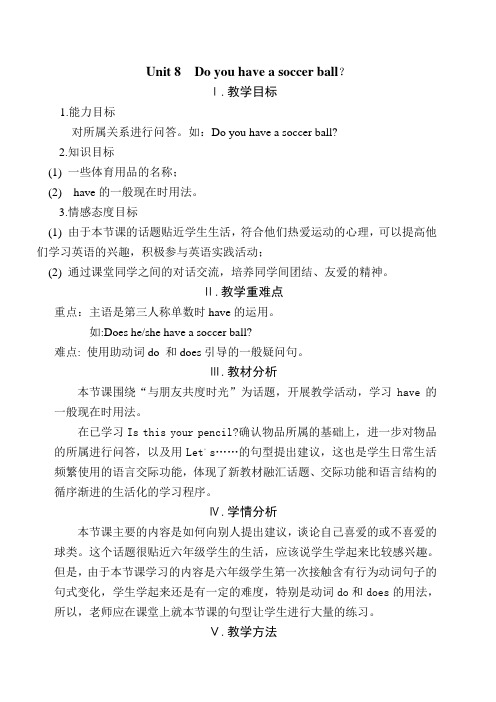
Unit 8 Do you have a soccer ball?Ⅰ.教学目标1.能力目标对所属关系进行问答。
如:Do you have a soccer ball?2.知识目标(1) 一些体育用品的名称;(2) have的一般现在时用法。
3.情感态度目标(1) 由于本节课的话题贴近学生生活,符合他们热爱运动的心理,可以提高他们学习英语的兴趣,积极参与英语实践活动;(2) 通过课堂同学之间的对话交流,培养同学间团结、友爱的精神。
Ⅱ.教学重难点重点:主语是第三人称单数时have的运用。
如:Does he/she have a soccer ball?难点: 使用助动词do 和does引导的一般疑问句。
Ⅲ.教材分析本节课围绕“与朋友共度时光”为话题,开展教学活动,学习have的一般现在时用法。
在已学习Is this your pencil?确认物品所属的基础上,进一步对物品的所属进行问答,以及用Let,s……的句型提出建议,这也是学生日常生活频繁使用的语言交际功能,体现了新教材融汇话题、交际功能和语言结构的循序渐进的生活化的学习程序。
Ⅳ.学情分析本节课主要的内容是如何向别人提出建议,谈论自己喜爱的或不喜爱的球类。
这个话题很贴近六年级学生的生活,应该说学生学起来比较感兴趣。
但是,由于本节课学习的内容是六年级学生第一次接触含有行为动词句子的句式变化,学生学起来还是有一定的难度,特别是动词do和does的用法,所以,老师应在课堂上就本节课的句型让学生进行大量的练习。
Ⅴ.教学方法Listening practice and pairwork practiceⅥ.教学过程Step1:Warming up.Have a free talk.Step2: Review the words (Using some ball tools.)T: Boys and girls, what’s this?S: It’s a basketball.T: What’s this in English?S: A ping-pong ball.T: Great!Do you like playing basketball?S: Yes, we do.T: What other kind of balls do you know?S: Soccer ball football basketball tenni s…T:OK!Now let’s look at these pictures, please tell me their names. (出示图片,复习单词)S:Read loudly and spell them.Step 3: New lessonT: OK! We know lots of balls and rackets. This time look at the picture(出示图片),match the words with the things in the picture.T: Ready? OK, let’s check the answers.T: Ok, let’s do listening exercises. Activity 1b.Listen and circle the words you hear. Understand?S: OKT: En,let’s listen to the recorder.T:Check the answers.Step4: 导入句型T: So much for this. Now listen to me carefully, This is my basketball .I have a basketball. Do you have a basketball?S: Yes, I do. (No, I don’t)T: I have a ping-pong ball. Do you have a ping-pong ball?S1: Yes, I do. (No, I don’t.)S2,S3…: I have a soccer ball. Do you have a soccer ball?T: You are very clever. Now practice a conversation according to the pictures with your partners about these things. One asks and the other answers. For example: Do you have a…?OK?S:( Practice the conversations.)T: Stop here .I want some of you to show the conversation for us. Which pair? Please put up your hands.T:Listen to me carefully. Does he have a basketball? Yes, he does. No, he doesn’t. (利用实物举几个第三人称单数的例子,让学生模仿。
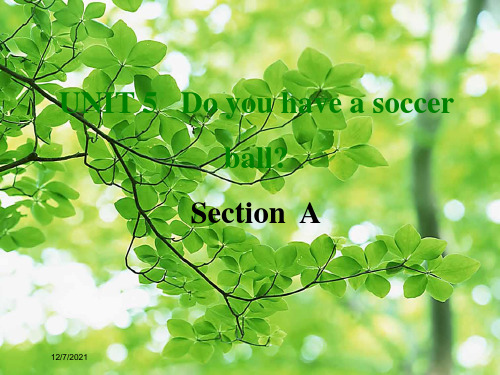
鲁教版英语六上Unit 8 Do you have a soccer ball 第一课时说课稿一. 教材分析鲁教版英语六上Unit 8 Do you have a soccer ball 第一课时,主要围绕询问和描述球类运动用品展开。
本节课的主要内容包括:学习球类名词,如soccer ball, basketball, volleyball等;学习询问球类运动用品的疑问词组,如How many, Do you have等;以及学习一般现在时的肯定句和否定句。
通过本节课的学习,学生能够掌握球类运动用品的词汇,运用疑问词组进行询问,并能用一般现在时进行描述。
二. 学情分析六年级的学生已经具备了一定的英语基础,能够听懂并运用简单的英语进行交流。
但是,对于球类运动用品的词汇和一般现在时的语法知识还较为陌生。
因此,在教学过程中,需要教师引导学生逐步掌握球类运动用品的词汇,以及运用疑问词组和一般现在时进行描述。
三. 说教学目标1.知识目标:学生能够掌握球类运动用品的词汇,如soccer ball,basketball, volleyball等;能够运用疑问词组,如How many, Do you have等,进行询问;能够用一般现在时进行描述。
2.能力目标:学生能够在情景中正确运用球类运动用品的词汇和疑问词组进行交流,并能用一般现在时描述球类运动用品的数量和特征。
3.情感目标:通过本节课的学习,学生能够激发对球类运动的兴趣,增强团队协作意识。
四. 说教学重难点1.教学重点:球类运动用品的词汇,如soccer ball, basketball,volleyball等;疑问词组,如How many, Do you have等;一般现在时的肯定句和否定句。
2.教学难点:一般现在时的运用,以及球类运动用品词汇的准确运用。
五. 说教学方法与手段1.教学方法:采用任务型教学法,情境教学法,合作学习法等。
2.教学手段:利用多媒体课件,图片,实物等辅助教学。
1 Unit 8 Do you have a soccer ball 【学习目标】 1、熟练掌握单词和词组do,does,have,tennis,ball,ping-pong,bat,soccer, volleyball,basketball; 2、会用Do you have a / an„? Yes, I do ./ No. I don’t.谈论物品所属关系。 【学习重点与考点】 运用Do you have a / an„? Yes, I do ./ No. I don’t. 【课前自学指导】 (一)大声朗读并记忆第43页1a的单词,并将单词与图中物品配对。 (二)听录音圈出1b中所听到的单词。 (三)知识链接: 1、Do you have a ping-pong ball?你有乒乓球吗? 这是一个一般疑问句。这种疑问句和前面所学的一般疑问句不同,这是借助助动词do来进行提问的。do在这里没有具体的意思,只是用来帮助实义动词构成一般疑问句。在英语中,句子的谓语动词如果是实义动词,常常借助动词do或does(主语为第三人称单数)构成疑问句。如: Do you know Smith? Does she have a bike? 这种一般疑问句的回答。也用Yes或No, 但注意其后一部分要用do或does其肯定回答是Yes,主语(人称代词)+do/does(主语是第三人称单数时用)其否定回答是No, 主语(人称代词)+don’t/doesn’t(主语是第三人称单数时用) Do you know Jim? Yes, I do./ No, I don’t. Does she have an ruler? Yes, she does. / No, she doesn’t. 2、 have 是及物动词,意为“有,拥有”。其第三人称单数形式是has它的后面加上人或物,表示“有„”如: I have two pens. 我有两支钢笔。 He has a bike.他有一辆自行车。 当has作谓语,变成一般疑问句时,要在句首加does, 而且,这时要把has还原成have. Does Mike have a football? She doesn’t have a bike.